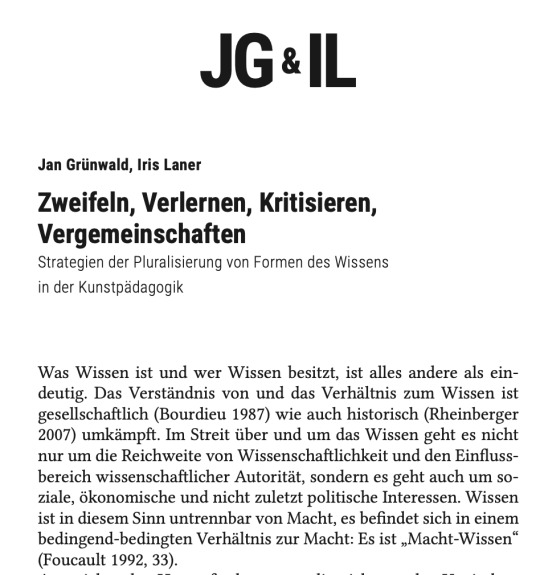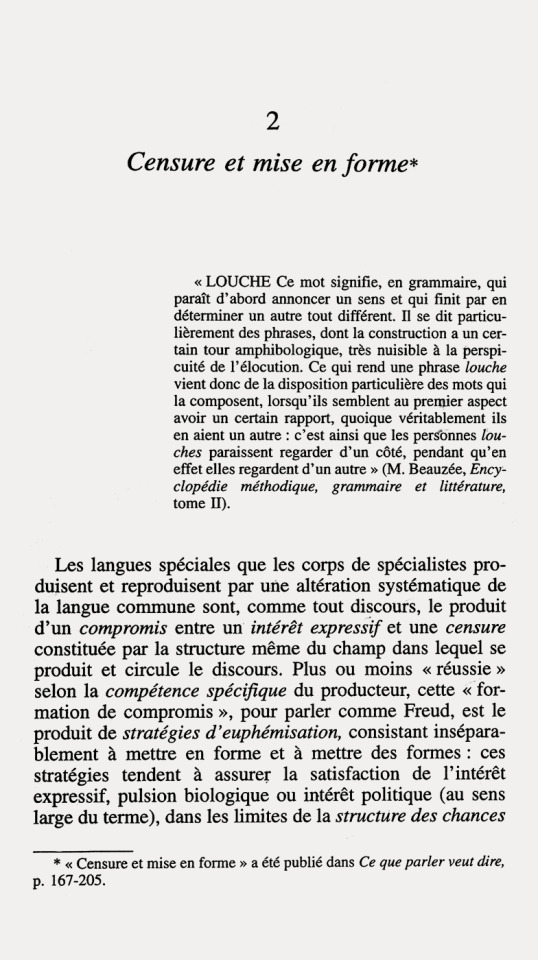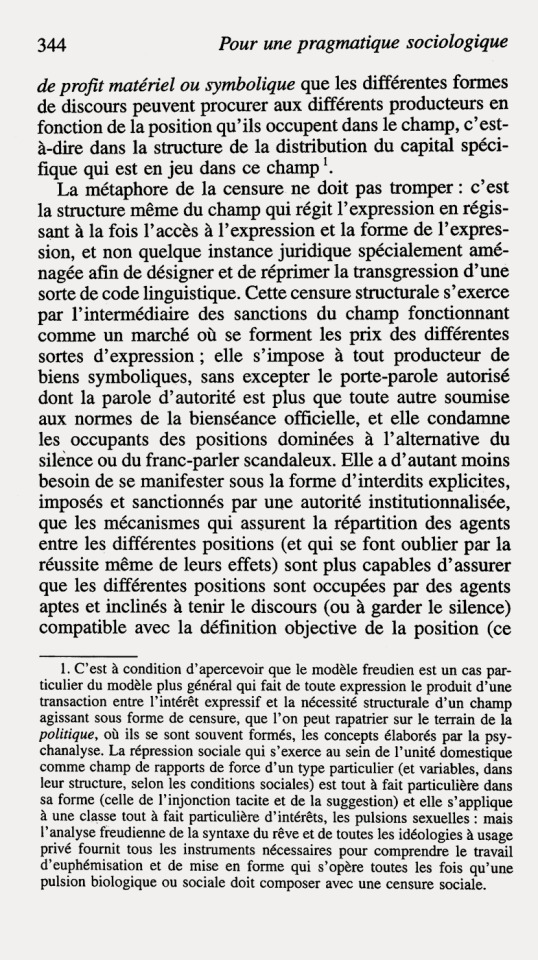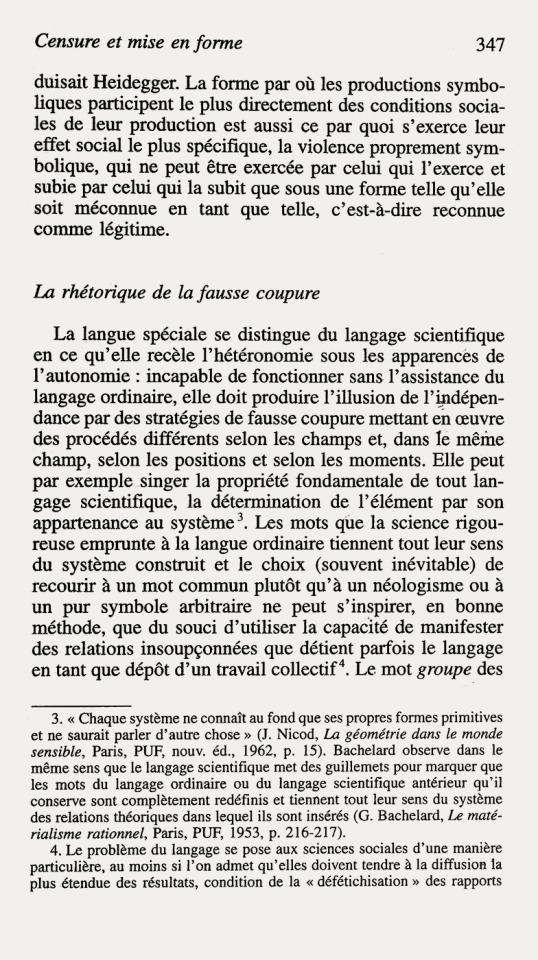#bourdieu
Text

What people really want in a webcomic are Bourdieu references. Follow for hawt hawt jokes about hyperreality, alienation, and schema too.
[ SH After Dark Archive ]
60 notes
·
View notes
Text
"La hiérarchie des genres (ou, dans un autre univers, des disciplines) semble être toujours et partout un des principaux facteurs déterminants des pratiques de production et de réception des
œuvres."
Pierre Bourdieu, Les Règles de l’art. Genèse et structure du champ littéraire, 1992
9 notes
·
View notes
Text




A collection of the last few days: Bourdieu and Murdoch Mysteries are enough to lead a happy life ♡
#dark academia#intj#personal#bourdieu#marxism#aesthetic#studyblr#academia#aesthetics#philosophy#sociology#murdoch mysteries#cbc murdoch
16 notes
·
View notes
Text
“These findings were later echoed by the renowned French sociologist Pierre Bourdieu in his 1979 book Distinction: A Social Critique of the Judgment of Taste.
In his body of work, Bourdieu described how “distance from necessity” characterized the affluent classes. In fact, Bourdieu coined the term “cultural capital.”
Once our basic physical and material needs are met, people can then spend more time cultivating what Bourdieu called the “dispositions of mind and body” in the form of intricate and expensive tastes and habits that the upper classes use to obtain distinction.
Corresponding with these sociological observations, the biologist Amotz Zahavi proposed that animals evolve certain displays, traits, and behaviors because they are so physically costly.
(…)
So for humans, top hats and designer handbags are costly signals of economic capacities; for gazelles, stotting is a costly signal of physical capacities.
Veblen, Bourdieu and Zahavi all claimed that humans—or animals—flaunt certain symbols, communicate in specific ways, and adopt costly means of expressing themselves, in order to obtain distinction from the masses.
Animals do this physically.
And affluent humans often do it economically and culturally, with their status symbols.
A difference, though, is that human signals often trickle to the rest of society, which weakens the power of the signal. Once a signal is adopted by the masses, the affluent abandon it.
(…)
The yearning for distinction is the key motive here.
And in order to convert economic capital into cultural capital, it must be publicly visible.
But distinction encompasses not only clothing or food or rituals. It also extends to ideas and beliefs and causes.
In his book WASPS: The Splendors and Miseries of an American Aristocracy, the author Michael Knox Beran examined the lives and habits of upper-class Americans from the mid-nineteenth to the mid-twentieth century.
He writes that “WASPS” had mixed feelings about their fellow citizens.
These upper-crust Americans viewed ordinary Americans as “sunk in moronic darkness” and that “It is a question whether a high WASP ever supported a fashionable cause without some secret knowledge that the cause was abhorred by the vulgarians.”
This still goes on today.
In the past, people displayed their membership in the upper class with their material accoutrements.
But today, because material goods have become a noisier signal of one’s social position and economic resources, the affluent have decoupled social status from goods, and re-attached it to beliefs.
The upper class craves distinction.
(…)
A 2020 study titled “The possession of high status strengthens the status motive” led by Cameron Anderson at UC Berkeley found that relative to lower-class individuals, upper-class individuals have a greater desire for wealth and status.
In other words, high-status people desire wealth and status more than anyone else.
(…)
Expressing a luxury belief is a manifestation of cultural capital, a signal of one’s fortunate economic circumstances.
There are other examples of luxury beliefs as well, such as the downplaying of individual agency in shaping life outcomes.
A 2019 study led by Joseph Daniels at Marquette University was published in the journal of Applied Economics Letters.
They found that individuals with higher income or a higher social status were the most likely to say that success results from luck and connections rather than hard work, while low-income individuals were more likely to say success comes from hard work and individual effort.
Well, which belief is more likely to be true?
Plenty of research indicates that compared with an external locus of control, an internal locus of control is associated with better academic, economic, health, and relationship outcomes. Believing you are responsible for your life’s direction rather than external forces appears to be beneficial.
Here’s the late Stanford psychology professor Albert Bandura. His vast body of research showed that belief in personal agency, or what he described as “self-efficacy,” has powerful positive effects on life outcomes.
Undermining self-efficacy will have little effect on the rich and educated, but will have pronounced effects for the less fortunate.
It’s also generally instructive to see what affluent people tell their kids. And what seems to happen is that affluent people often broadcast how they owe their success to luck. But then they tell their own children about the importance of hard work and individual effort.
(…)
When I was growing up in foster homes, or making minimum wage as a dishwasher, or serving in the military, I never heard words like “cultural appropriation” or “gendered” or “heteronormative.”
Working class people could not tell you what these terms mean. But if you visit an elite university, you’ll find plenty of affluent people who will eagerly explain them to you.
When people express unusual beliefs that are at odds with conventional opinion, like defunding the police or downplaying hard work, or using peculiar vocabulary, often what they are really saying is, “I was educated at a top university” or “I have the means and time to acquire these esoteric ideas.”
Only the affluent can learn these things because ordinary people have real problems to worry about.
To this extent, Pierre Bourdieu in The Forms of Capital wrote, “The best measure of cultural capital is undoubtedly the amount of time devoted to acquiring it.”
The chief purpose of luxury beliefs is to indicate evidence of the believer’s social class and education.
Members of the luxury belief class promote these ideas because it advances their social standing and because they know that the adoption of these policies or beliefs will cost them less than others.
(…)
Why are affluent people more susceptible to luxury beliefs? They can afford it. And they care the most about status.
In short, luxury beliefs are the new status symbols.
They are honest indicators of one’s social position, one’s level of wealth, where one was educated, and how much leisure time they have to adopt these fashionable beliefs.
And just as many luxury goods often start with the rich but eventually become available to everyone, so it is with luxury beliefs.
But unlike luxury goods, luxury beliefs can have long term detrimental effects for the poor and working class. However costly these beliefs are for the rich, they often inflict even greater costs on everyone else.”
#henderson#rob henderson#luxury beliefs#luxury#psychology#bourdieu#pierre bourdieu#veblen#thorstein veblen#zahavi#amotz zahavi#beran#michael knox beran#class#status#status symbols#peacock
2 notes
·
View notes
Text

My bookshelf 😽📚 What I read when I am not promoting #TheColourOfGuilt 💙
#books and novels#sociology#pierre bourdieu#bookworms#bourdieu#black creators#writers#bell hooks#james baldwin#author#novel writing#nancy delautrecs#emotional intelligence#intellectualisation#mental illness#racism#crt#critical race theory#critical race studies#sociologie#web novel#feminism#feminisme#the fire next time#bookworm#bookshelf#bookshelves
3 notes
·
View notes
Text
Bourdieu is trying to kill me with his mind, we are fighting a psychic battle right now. That man never wrote an intelligible sentence in his life, la distinction (1979) is an attempt to kill.
6 notes
·
View notes
Text
Hegel's Closed Dialectics and Marx's Open Monism
Hegel writes, “What is rational is real; and what is real is rational”1, to which François Laruelle responds: “The real is communicational, the communicational is real”2, but why? Why this distinction? Is it a distinction? What’s at stake? In other words, what’s the difference between saying that something’s “rational” and that it’s “communicational?”
Because Hegel wrote in the Enlightenment, or…
View On WordPress
#Bourdieu#Communication#Communication Theory#Dialectics#Hegel#History#Immanence#Laruelle#Marx#Media Theory#Monism#Philosophy#Philosophy of History#Political Philosophy#Practice#Process#Psychology#writersoftumblr#writersontumblr#Writing
4 notes
·
View notes
Text




Fotografías año 2022 por @deinorph (en Instagram) para @aquelarre.arneses_ (Instagram)
#modelo#photography#portrait photography#photographers on tumblr#street style#film photography#fashion#gothic#dark aesthetic#dark academism#bourdieu#goth girl#goth outfit#goth#goth gf#gothcore#gothgirl#altfashion#model photography#model photoshoot#curvy girls#curvy model#curvy girl
8 notes
·
View notes
Text
This embezzlement is latent in the fact that a group as a whole can be represented, in the various meanings of the word, by a subgroup, clearly delimited and perfectly visible to all, known to all, and recognized by all, that of the nobiles, the ‘people who are known,’ the paradigm of whom is the nobility, and who may speak on behalf of the whole group, represent the whole group, and exercise authority in the name of the whole group. The noble is the group personified. He bears the name of the group to which he gives his name (the metonymy which links the noble to his group is clearly seen when Shakespeare calls Cleopatra ‘Egypt’ or the King of France ‘France,’ just as Racine calls Pyrrhus ‘Epirus’). It is by him, his name, the difference it proclaims, that the members of his group, the liegemen, and also the land and castles, are known and recognized. Similarly, phenomena such as the ‘personality cult’ or the identification of parties, trade unions, or movements with their leader are latent in the very logic of representation. Everything combines to cause the signifier to take the place of the signified, the spokesmen that of the group he is supposed to express, not least because his distinction, his ‘outstandingness,’ his visibility constitute the essential part, if not the essence, of this power, which, being entirely set within the logic of knowledge and acknowledgment, is fundamentally a symbolic power; but also because the representative, the sign, the emblem, may be, and create, the whole reality of groups which receive effective social existence only in and through representation.
on the existence or non-existence of a caliph of Rationality
#bourdieu#the forms of capital (1986)#the best part is where your spokesmen are imputed upon you by your enemies#moldbug turns this into a kind of judo move where any weak defenders of him are stuck in the brutal swamps of comparing statistics#from the victorian era#while his strongest defenders can seize upon the bullshit about stuart restoration and preach against the evils of demotism:#the evils of Dissenters of habeas of the confirmation of the advisors to the executive by the legislature etc.
2 notes
·
View notes
Text
I've been reading Bourdieu, Foucault and Lezama Lima during the past two weeks because I have two exams, one on Tuesday and another on Thursday.
Right now the only thing I want to do is fight capitalism and imperialism and kill the rich.
Also I might be sleep deprived
#capitalism#imperialism#literatura latinoamericana#latinoamerica#jose lezama lima#lezama lima#michel foucault#foucault#pierre bourdieu#Bourdieu#kill the rich
1 note
·
View note
Photo

Die feinen Unterschiede, Framing, Tabloid #Bourdieu #Gesellschaft #Tabloid #Kippe https://www.instagram.com/p/CouZS36tF-h/?igshid=NGJjMDIxMWI=
0 notes
Text
Künste anwenden
Im Band zur SOMA Tagung, mit dem Titel “Künste anwenden” erscheint ein gemeinsamer Text von Iris Laner und mir.


1 note
·
View note
Text

Dating apps and male beauty standards: Why are Tinder users so obsessed with height? (Ana Bulnes, El País, July 19 2022)
—
I'm fascinated by this line of reasoning
hugging a short man reminds her of hugging a child, and that's wrong and unappealing......
which means that the other way around is erotic to her, it turns her on to appear like a child-like figure to men?
she desperately needs to feel protected by the one man who's actually her #1 predator?
and god forbid he doesn't tower over her when she wears dumbass stilettos
at some point straight women need to get a fucking grip, no offense
—
Masculine Domination (Pierre Bourdieu, 1998)
“Surveys show, for example, that a large majority of French women say they want a husband who is older and also (quite coherently) taller than themselves; two-thirds of them even explicitly reject the idea of a husband shorter than themselves.
What is the meaning of this refusal to see the disappearance of the ordinary signs of the sexual ‘hierarchy’? (…)
Because these common principles tacitly and unarguably demand that, at least in appearances and seen from outside, the man should occupy the dominant position within the couple, it is for him, for the sake of the dignity that they recognize a priori in him, but also for themselves, that they can only want and love a man whose dignity is clearly affirmed and attested in and by the fact that he is visibly 'above’ them.
This takes place, of course, without any calculation, through the apparent arbitrariness of an inclination that is not amenable to discussion or reason but which, as is shown by observation of the desired, and also real, differences, can only arise and be fulfilled in the experience of the superiority of which age and height (justified as indices of maturity and guarantees of security) are the most indisputable and universally recognized signs.”
23 notes
·
View notes
Note
What makes an artwork highbrow? What makes another low?
Keeping in mind that this is a sociological rather than an aesthetic distinction, I believe the distinction hinges on how much you already have to know about art in general to appreciate any given work. As the sociologist Pierre Bourdieu writes:
A genre containing ever more references to the history of that genre calls for a second-degree reading, reserved for the initiate, who can only grasp the work’s nuances and subtleties by relating it back to previous works. By introducing subtle breaks and fine variations, with regard to assumed expectations, the play of internal allusions (the same one that has always been practised by lettered traditions) authorizes detached and distanced perception, quite as much as first-degree adherence, and calls for either erudite analysis or the aesthete’s wink.
This is most obvious in the case of a work that is both intensely allusive and extremely sophisticated in technique, like Ulysses, but it also applies to works of a radical simplicity or even contentlessness, like the writings of Gertrude Stein or the paintings of Jackson Pollock, where you have to know enough about art to know why this apparent non-art ("my toddler could paint that!") is actually very serious and meaningful art.
In practice, these distinctions don't hold. They don't hold aesthetically, because most actual practitioners say that the relevant distinction is not high and low but good and bad. But they also don't hold sociologically. The high-low distinction only applies after the mass literacy of the late 19th century, which generated both a mass culture industry and writers and artists who wanted to set themselves apart from this mass culture industry. The very same industry, however, produces such a proliferation of niche markets that even low-art genres become as complex and recursive in their own traditions as the high-art genres, such that you can't really just hand The Big Sleep or Dune or Watchmen to a person off the street anymore than you could with Ulysses. This is the symbolic import of the factoid I am always insisting upon: that this all comes from Poe, that Poe invents both Mallarmé and Lovecraft.
Then "middlebrow" as a concept presents problems of its own. A serious critic wants to scorn the middlebrow and uphold only the raw energy of the lowbrow and the radical intellection of the highbrow, but this standard is too severe. Anti-middlebrow critics get trapped in a hipper-than-thou spiral, or, to vary my image, they futilely chase an unreachable horizon of authenticity and difficulty. There is such a thing as middlebrow—we know it when we see it—but if you become obsessed with the idea, then soon you'll find that nothing is astringent enough for your taste. Anti-middlebrow critics may start by dismissing Our Town and The Grapes of Wrath, but they will inevitably end up writing "Against Ulysses."
Finally, these categories assume too much about who attends to what, and where and when and for what purpose. I quoted that Bourdieu passage above this summer in my Oppenheimer essay. Is Oppenheimer lowbrow, middlebrow, or highbrow? A film made for and sold to a mass audience through memes and sex appeal (lowbrow), a film full of Big Themes and Human Interest and Major Issues (middlebrow), a film formally ambitious, politically ambiguous, tragic in theme, and freighted with unexplained scientific, historical, political, and cultural allusions (highbrow)? I just don't think it's a very interesting question.
Do these categories explain why I read about Ulysses on Microsoft Encarta when I was 13 years old? (It included a recording of an Irish actress doing some of Molly Bloom's interior monologue.) I first checked the novel out of my suburban public branch library the summer of the same year and determined to read it, a task I admittedly didn't accomplish in full until later, when I was in college, just as Bourdieu would predict. But the ambition first found me in the lower-middle-class suburbs through a simple consumer conveyance rather than through any type of elite training.
I don't mean to sound a note of false populism here, to suggest that there's much hidden greatness in the morass of cranked-out junk clogging Amazon. It is, as I've written, "lonely at the top." My populist instinct, insofar as I have one, runs in the other direction: not "low art is actually great" but rather "great art is actually for everyone." (Or perhaps not "everyone" but "anyone." Not every single person but any single person capable of being found by it, which can't be determined in advance.) Still, the worth of a work of art is not extrinsically determined by the position it occupies in the social field, as the sociologists claim, but rather relies on its intrinsic merit in dynamic interaction with an unpredictable range of actual and potential audience members.
19 notes
·
View notes
Text

Pierre Bourdieu, (1982, 1991), Langage et pouvoir symbolique, Foreword by John B. Thompson (1991), Éditions de Seuil, 2001, pp. 343-347




#graphic design#sociology#history of philosophy#history of science#book#pierre bourdieu#john thompson#éditions de seuil#1980s#1990s#2000s
9 notes
·
View notes